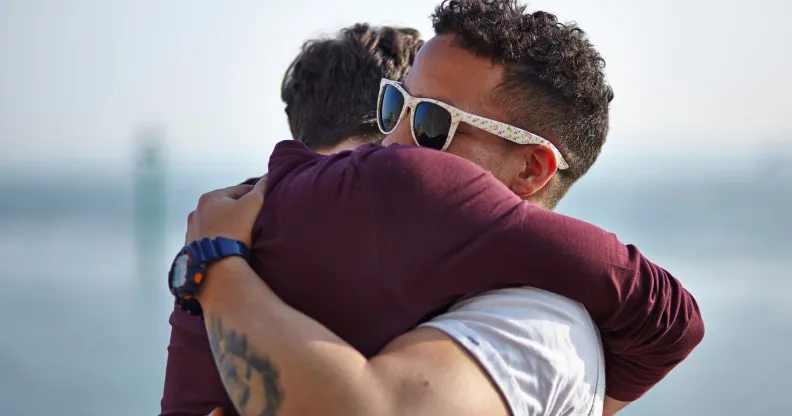Men uncomfortable with gay bars, crying, applying sun cream and saying ‘I love you’, study finds

Crying in front of a same-sex friend is twice as difficult for men, the poll found. (Getty)
Men are reportedly twice as likely to feel uncomfortable going to a gay bar than women, a new poll has found.
Statistics collective by UK-based polling company YouGov found a huge number of men still struggle to feel comfortable in gay bars, crying in front of their same-sex friends, saying “I love you” to a relative of the same gender or even applying sun cream to a friend’s back.
Out of 1,982 male respondents (of a 4,095 total sample size) 44 per cent said they felt uncomfortable going to a gay bar compared to 20 per cent of women who said they wouldn’t feel comfortable.
This was more of an issue with older men, with 59 per cent of those aged 65 and over saying they don’t want to go to a gay bar.
The colour pink is also reportedly a fairly significant issue for men in the UK, with 31 per cent saying they would be reluctant to wear anything of that colour.
Even worse than the colour pink is the concept of crying in front of your same-sex friend, with 48 per cent of men saying doing so would make them uncomfortable.
Comparatively, 18 per cent of women wouldn’t like to cry in front of a friend of the same gender, while 9 per cent have issues with the colour pink.
Women were only more uncomfortable than men in one instance, with 67 per cent of saying they wouldn’t feel comfortable being naked in a same-sex changing room, while 49 per cent of men voted similarly.
A large number of male respondents, 42 per cent, also said they would feel uncomfortable applying sun cream to the back of a friend of the same gender.
Men feel increasingly under pressure to ‘man up’
A number of people have suggested these statistics derive from men’s difficulty to emotionally open up in a society that pressures them to “man up”.
A 2019 report from men’s health charity Movember found that 45 per cent of 18-34 year olds have avoided talking about their problems for fear of sounding less masculine.
Furthermore, 54 per cent think masculinity is about being “strong” emotionally and physically, meaning to cut off any emotional vulnerability.
“Bottling up your feelings isn’t the best way of dealing with mental health challenges so we need to continue tackling these outdated ideas which are harming men,” Movember’s global mental health director, Brendan Maher, said at the time.
“Being seen as emotionally strong or stoic isn’t necessarily a bad thing – there’s a time and a place for it. But if the pressure to uphold this façade means that men can’t talk about their problems, then that can have a really negative impact on their mental wellbeing.”
Middle-aged men are more likely to die by suicide than any other group, according to the Samaritans.
“Although we’ve made great strides in raising awareness of the challenges in men’s mental health and the importance of speaking up especially when you’re struggling, it is worrying that young men in the UK are still feeling under pressure to conform to age-old, masculine stereotypes.”
Suicide is preventable. Readers who are affected by the issues raised in this story are encouraged to contact Samaritans on 116 123 (www.samaritans.org), or Mind on 0300 123 3393 (www.mind.org.uk). Readers in the US are encouraged to contact the National Suicide Prevention Line on 1-800-273-8255.
How did this story make you feel?

